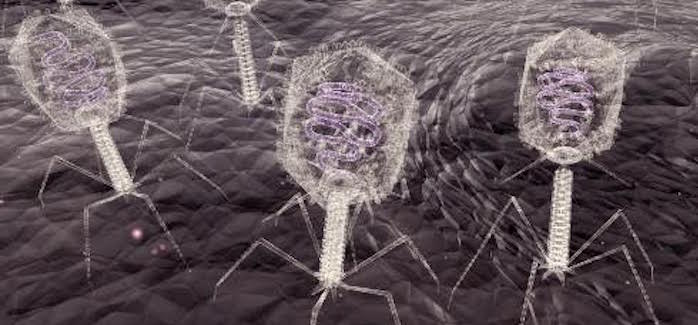Research carried out on pigs at the University of Leicester could open the door to a ‘game-changing’ new approach to tackling disease in humans and animals that reduces the global need for antibiotics.
The study, funded by AHDB Pork and unveiled at the Pigs 2022 conference in Solihull this week, is based on the discovery of an organism able to target harmful bacteria and leave ‘good’ bacteria intact in pigs.
Professor Martha Clokie and her team at the University of Leicester isolated 20 bacteriophages – or bacterial viruses – that target 72 strains of potentially drug-resistant bacteria that can cause gut problems in pigs.
Prof Clokie, who presented the results in a video shown at the Pigs 2022 event, said the results indicated that phage therapy could be ‘completely transformative for human health’.
Scientists have been trying to develop phage treatments for more than a century but they have mostly proved to be unreliable. But Prof Clokie has found more precise ways of isolating phages and assessing their effectiveness.
The researchers believe the breakthrough could help drive a long term change in how people with drug-resistant infections are treated, as well as transforming the treatment of animals on farm.
Phages occur in nature and work by latching on to infections and killing them by injecting their own DNA. There are many phages, each of which is specific to different infectious bugs. They reproduce inside the infectious bug and these new phages go on to hunt other infections.
Salmonella bug
Prof Clokie and her team have identified a range of disease-killing phages, including one that disables a salmonella bug that infects pigs. Her team has shown that it works in the lab and the scientists have also developed a powdered form of the phage which remains active. They plan to begin trails later this year.
If these trials yield positive results, other phage treatments could be developed for a range of animal diseases and, potentially, for humans, too.
“There are many infections that we just can’t treat with antibiotics because they have become resistant to them,” Prof Clokie told BBC News, which was one of the outlets to cover the story. “So using the phage therapy for specific diseases could change the way we treat infection. It could give us a whole new armoury.”
Dr Charlotte Evans, technical senior manager with AHDB Pork, said bacteriophages are found everywhere in the environment, in humans and animals, so can be regarded as a ‘natural’ defence.
She said: “There’s still a long way to go in terms of trials and licensing but we are very pleased this research, which was started two years ago, has already yielded such promising results.
“Bacteriophage treatment is about using increased volumes of something that is already present to target harmful bacteria. Research suggests they do not harm other organisms because the relevant receptor is not present.”
The next step is to determine whether bacteriophages could be applied via spray, injection or vaccination, or by adding to feed or water, she added.
Game-changer
The development was welcomed by the Responsible Use of Medicines in Agriculture (RUMA) alliance, which described the discovery as a potential ‘game-changer’.
RUMA secretary general John FitzGerald said: “The issue of antibiotic resistance is one shared by human and animal medicine, and a number of initiatives across medical and veterinary sciences are attempting to understand and reduce the spread of resistance genes in bacteria.
“Phage technology is in fact fairly old, but its development stalled because antibiotics were – until recently – very effective against a broad spectrum of bacteria.
“However, the build-up of resistance has created new opportunities for phage technology; a discovery such as this could be a real game-changer, not just helping the farming industry to steward antibiotics more effectively but potentially speeding up the development of human medical applications.”
Around 37% of the UK’s antibiotics are currently used for treating disease in farm animals but sales figures show usage is falling, with the pig sector expected to record large decreases for 2016 and 2017.




